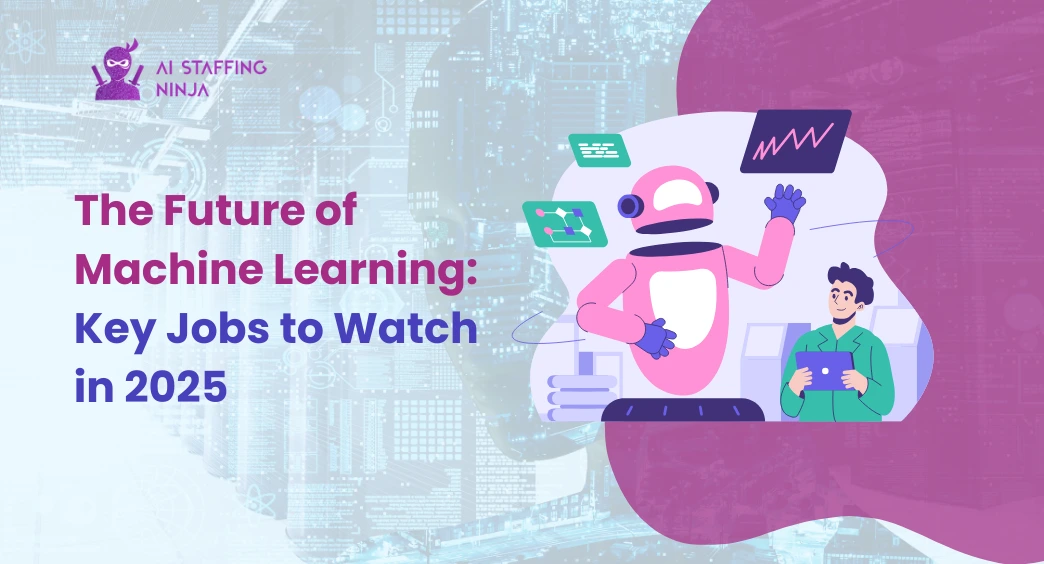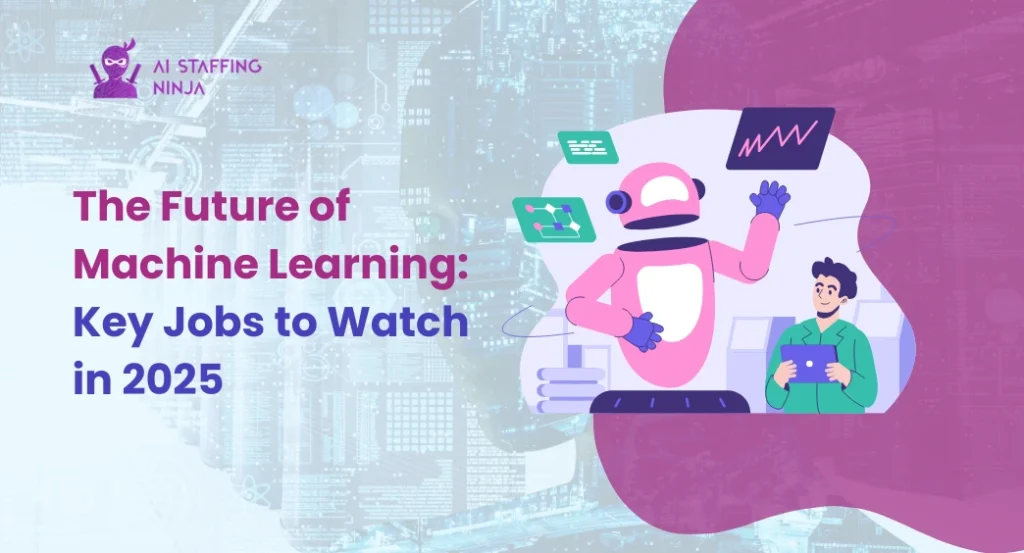
- By : By Staffing Ninja
Best Machine Learning Jobs for 2025

The demand for machine learning professionals has been steadily increasing in recent years and is expected to continue to accelerate in 2025, despite the fact that there are only a handful of them worldwide. The growing integration of AI and machine learning into large corporations is driving this increase in widely diverse career opportunities. The top ML jobs in 2025 include machine learning engineers, data analysts, research scientists, developers, and more. Explore this article for a deeper understanding of these roles.
Top Machine Learning Careers in 2025
1. Machine Learning Engineer
Role Overview:
- ML engineers draft, create, upskill, and optimize ML models that data scientists develop.
- Their expertise in integrating AI into real-life applications demands close collaboration with software developers and data scientists.
Key Skills:
- Programming languages like Python, TensorFlow, PyTorch, and cloud computing.
- Insight on machine learning algorithms, data modeling and optimization, applied mathematics, and neural networks.
Industry Applications:
- MLEs find ML jobs in facial recognition, email automation, spam filtering, social media optimization, predictive analysis, healthcare diagnostics, and e-commerce.
2. Data Scientist
Role Overview:
- Data scientists analyze complex datasets and predict patterns by creating models to reveal insights.
- Their roles include wrangling, cleaning, and analyzing data; performing data mining and development; data models creation; data visualization; and experimentation in business decision-making.
Key Skills:
- Programming languages like Python, R, and SQL.
- Expertise in data visualization tools like Tableau and Power BI.
- Remarkable skills in problem-solving and analysis, mathematics, communication, teamwork, and planning.
Industry Applications:
- Predictive analysis in marketing, risk assessment in fintech, fraud detection in banking, recommendation systems in healthcare, and decision-making in technology.
3. Natural Language Processing (NLP) Engineer
Role Overview:
- NLP engineers retrieve and preprocess data, develop, train, analyze, and optimize AI models, initiating research and innovation.
- They work on chatbots, language translation, and speech recognition tools.
Key Skills:
- Programming languages: Python, Java
- NLP libraries like Hugging Face and SpaCy
- Deep learning techniques like Recurrent Neural Networks (RNNs)
Industry Applications:
- Used in creating virtual assistants like AI chatbots for customer service, voice assistants like Siri, autocorrect and autocomplete platforms, and AI-driven content moderation tools.
4. Computer Vision Engineer
Role Overview:
- Create and implement computer vision algorithms, optimize existing systems, and develop AI models that analyze images and videos for specific tasks.
- Includes object detection, facial recognition, self-driving cars, and security applications.
Key Skills:
- Tools like OpenCV, PyTorch, and TensorFlow.
- Deep learning architectures like Convolutional Neural Networks (CNNs), RNNs, and LSTMs.
- Mathematics, linear algebra, calculus, probability, and statistics.
- Programming in C++, MATLAB, and Python.
- Image processing and manipulation techniques.
Industry Applications:
- Object detection for self-driving cars, facial recognition, sports performance analysis, detecting manufacturing faults, classifying plant species, quality control in manufacturing, and medical anomaly detection.
5. AI Research Scientist
Role Overview:
- Develop new AI models and optimize existing ones, develop algorithms, analyze data, drive AI innovations, and mentor budding researchers.
- Work in academia, research labs, and big tech companies conducting AI research.
Key Skills:
- Mathematical modeling, deep learning, analytical thinking, domain expertise, data analysis, AI deployment, and generative AI.
- Expertise in research tools like TensorFlow and MATLAB.
Industry Applications:
- AI research in robotics, improving natural language models, and ethical AI development.
- Fraud detection and prevention in banking, personalized shopping experience in e-commerce, medical imaging in healthcare, tracking and monitoring shipments in supply chain and logistics, and personalizing itineraries in travel.
How to Start a Career in Machine Learning?
A career in ML jobs begins with a basic degree in computer science and mastering a programming language, followed by strong mathematical skills and machine learning concepts. Boot camps and certifications provide hands-on experience with projects, and learning platforms like Coursera and Udacity assist in mastering data science tools. Networking, internships, and developing personal ML projects allow you to explore deep learning techniques, which ultimately contribute to your professional development. To gain further skill exposure, look into the numerous job openings available through a reputable AI recruitment agency. Also, if you are looking for the best ML jobs that are just around the corner, contact a top ML staffing solution.
Final Thoughts
The job market teems with the best ML jobs, like ML Engineer, Data Scientist, NLP Engineer, Computer Vision Engineer, and AI Research Scientist. With AI and robotics sweeping the universe, AI recruitment is taking on new dimensions, making now an excellent time to kick off your AI career. Simply take the initiative and master machine language skills to stand out in the highly competitive AI job market.